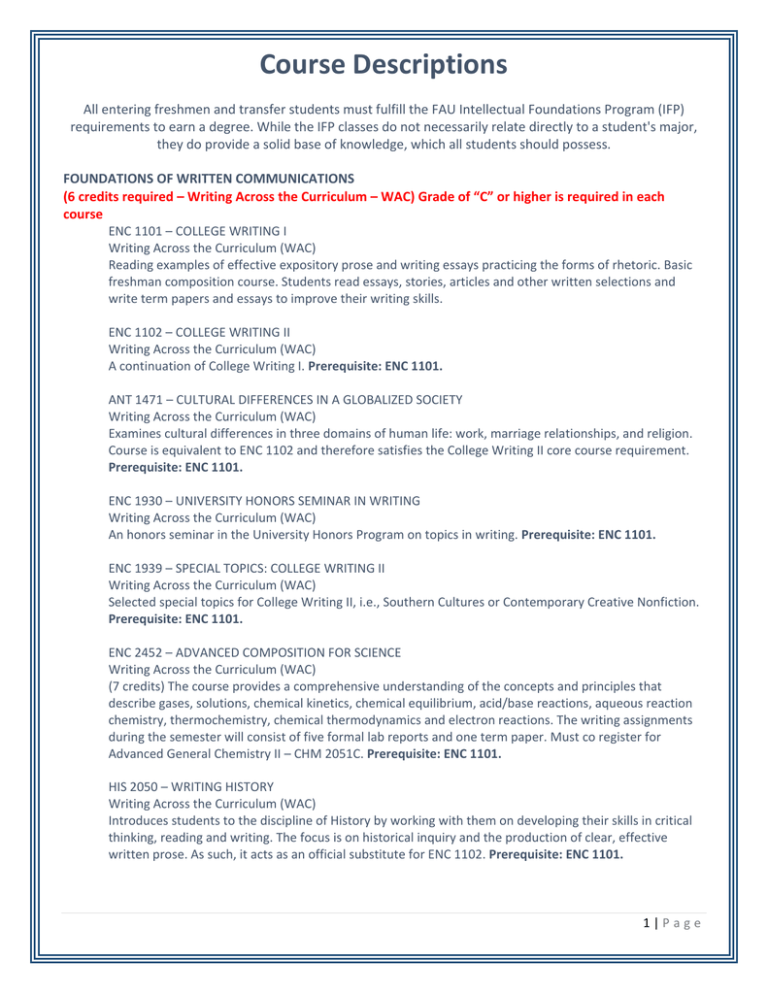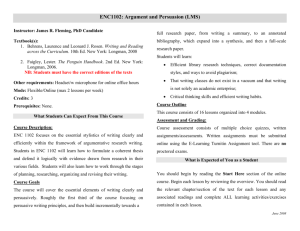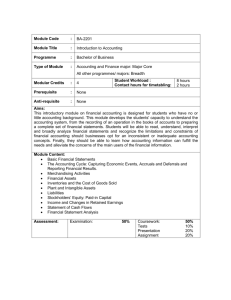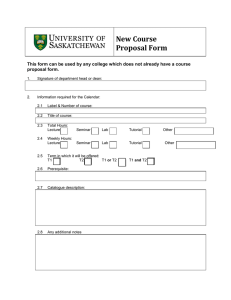FAU IFP Course Descriptions: Writing & Science Foundations
advertisement

Course Descriptions All entering freshmen and transfer students must fulfill the FAU Intellectual Foundations Program (IFP) requirements to earn a degree. While the IFP classes do not necessarily relate directly to a student's major, they do provide a solid base of knowledge, which all students should possess. FOUNDATIONS OF WRITTEN COMMUNICATIONS (6 credits required – Writing Across the Curriculum – WAC) Grade of “C” or higher is required in each course ENC 1101 – COLLEGE WRITING I Writing Across the Curriculum (WAC) Reading examples of effective expository prose and writing essays practicing the forms of rhetoric. Basic freshman composition course. Students read essays, stories, articles and other written selections and write term papers and essays to improve their writing skills. ENC 1102 – COLLEGE WRITING II Writing Across the Curriculum (WAC) A continuation of College Writing I. Prerequisite: ENC 1101. ANT 1471 – CULTURAL DIFFERENCES IN A GLOBALIZED SOCIETY Writing Across the Curriculum (WAC) Examines cultural differences in three domains of human life: work, marriage relationships, and religion. Course is equivalent to ENC 1102 and therefore satisfies the College Writing II core course requirement. Prerequisite: ENC 1101. ENC 1930 – UNIVERSITY HONORS SEMINAR IN WRITING Writing Across the Curriculum (WAC) An honors seminar in the University Honors Program on topics in writing. Prerequisite: ENC 1101. ENC 1939 – SPECIAL TOPICS: COLLEGE WRITING II Writing Across the Curriculum (WAC) Selected special topics for College Writing II, i.e., Southern Cultures or Contemporary Creative Nonfiction. Prerequisite: ENC 1101. ENC 2452 – ADVANCED COMPOSITION FOR SCIENCE Writing Across the Curriculum (WAC) (7 credits) The course provides a comprehensive understanding of the concepts and principles that describe gases, solutions, chemical kinetics, chemical equilibrium, acid/base reactions, aqueous reaction chemistry, thermochemistry, chemical thermodynamics and electron reactions. The writing assignments during the semester will consist of five formal lab reports and one term paper. Must co register for Advanced General Chemistry II – CHM 2051C. Prerequisite: ENC 1101. HIS 2050 – WRITING HISTORY Writing Across the Curriculum (WAC) Introduces students to the discipline of History by working with them on developing their skills in critical thinking, reading and writing. The focus is on historical inquiry and the production of clear, effective written prose. As such, it acts as an official substitute for ENC 1102. Prerequisite: ENC 1101. 1|Page NSP 1195 – BEING CARED FOR: REFLECTIONS FROM THE OTHER SIDE OF THE BED Writing Across the Curriculum (WAC) Exploration through writing, reading, and thinking about the concept “being cared for” and its meaning to the individual as a member of society as well as a future health care professional. Course encompasses a variety of writing assignments based on readings and reflections on the situation of being nursed. Prerequisite: ENC 1101. Note: These classes must be taken in sequence. FOUNDATIONS OF SCIENCE & THE NATURAL WORLD (6 credits required – One of the courses must have a lab) Student must take two of the following courses, one must be from group A. The second course may be from group A or group B. GROUP A BIOLOGY DEPARTMENT BSC 1005 & LAB - LIFE SCIENCE & LAB A survey of life on earth for non-majors. Evolution, anatomy, physiology, genetics, reproduction, and ecology are stressed. Lectures and discussions also demonstrate how biological knowledge is relevant to social, economic, environmental and philosophical problems. BSC 1005 LABORATORYinvestigation of biological knowledge relevant to social, economic, environmental and philosophical problems. BSC 1010 & LAB & DISCUSSION – BIOLOGICAL PRINCIPLES A comprehensive treatment of biological principles, including the scientific method, evolution and natural selection, cell biology, energy transformation, reproduction, development, genetics and molecular biology. BSC 1010 LABORATORY- An introduction to general laboratory procedures to demonstrate the basic principles of biology. BSC 2085 & LAB - ANATOMY & PHYSIOLOGY I A study of structure and physiology from the cellular to the system levels in the human body, including integumentary, skeletal, muscular, nervous and endocrine. BSC 2085 LABORATORYLaboratory investigations to augment the content of lecture. 4 credits with lab. Required for Nursing majors in their first semester. Also required for Exercise Science and Wellness Program. CHEMISTRY DEPARTMENT CHM 1020C - CONTEMPORARY CHEMICAL ISSUES Basic chemical principles behind contemporary chemical issues facing the local community, state, nation and the world. Topics will include water management, global warming, depletion of the ozone layer and its consequences. Course meets lab requirement. Lab is included in lecture classes. CHM 2045 & LAB - GENERAL CHEMISTRY I An introduction to chemical principles, including atomic structure, chemical bonding, kinetics, thermodynamics and properties of the elements. A prerequisite to all other chemistry courses in science programs. CHM2045 LABORATORY- An introduction to experimental techniques in chemistry designed to demonstrate basic chemical principles. Students must have passed CHM 1025 or must be currently enrolled or have previously passed one of the following: MAC 1105, MAC 1114, MAC 1140, MAC 1147, MAC 2233, MAC 2281, MAC 2311. 2|Page GEOSCIENCES DEPARTMENT ESC 2000 - THE BLUE PLANET On-line (distance learning) course. Survey introduction to earth system science with an emphasis on the interactions between earth, ocean and atmosphere. Special attention will be paid to greenhouse effect, ozone depletion, and global change. Course is oriented to students not majoring in science. PHYSICS DEPARTMENT AST 2002 - INTRODUCTION TO ASTRONOMY The development and present state of our understanding of the universe. Designed for nonscience majors; no credit for Physics majors. Grading: Pass/fail option. PHY 2048 & LAB - GENERAL PHYSICS I Intended for science majors, the course surveys the fundamental laws and phenomena of mechanics, fluids, heat, wave motion, and sound. Emphasis on mathematical analysis of physical problems. PHY 2048 LABORATORY- Experiments in mechanics, fluids, heat, wave motion and sound comprise this course. Several classes cover developing theoretical problem solving techniques. Prerequisite: MAC 2311 or MAC 2281. PHY 2053 - COLLEGE PHYSICS I The algebra - and trigonometry-based course surveys fundamental laws and phenomena of mechanics, fluids, heat, wave motion, and sound. Emphasis on understanding of physical concepts through examples drawn from the physical and life sciences. No credit for physics majors. The required lab course is PHY 2048 Lab. Prerequisite: Minimum grade of “C” in one of the following: MAC 1114 or 1147 or 2233 or 2281 or 2311. GROUP B ANTHROPOLOGY DEPARTMENT ANT 2511 & LAB - INTRO TO BIOLOGICAL ANTHROPOLOGY & LAB Students learn about the general topics in biological anthropology, including genetics, primatology, comparative anatomy and paleoanthropology. ANT 2511 LABORATORY- the students perform procedures similar to those used by professional anthropological researchers and engage in hands-on activities designed to reinforce the material presented in the lecture section. BIOLOGY DEPARTMENT BSC 1011 & LAB & DISCUSSION - BIODIVERSITY WITH LAB AND DISCUSSION An introduction and survey of organismal diversity, including fungi, protists, plants and animals. Phylogenetic relationships, evolutionary mechanisms, and ecological processes are emphasized. Origins of life and human evolution. BSC 1011 LABORATORY - A survey of the diversity of eukaryotic organisms. CHEMISTRY DEPARTMENT CHM 2032 & LAB - CHEMISTRY FOR HEALTH SCIENCES An introduction to the fundamental concepts of chemistry: scientific measurements; atomic theory; molecules and chemical bonds; chemical reactions; aqueous solutions; salts and electrolytes; acid-base theory; radioactivity and nuclear chemistry. Orientation toward Nursing and allied health majors. CHM 2032 LABORATORY - Intermediate experimental studies of chemical principles. 3|Page CHM 2083 - CHEMISTRY IN MODERN LIFE On-line (distance learning) course. A lucid, elementary exposition of the multifaceted contribution of chemistry to modern culture, vividly illustrated by demonstration. Course does not require previous experience in chemistry in secondary school or college. Recommended for non-science, mathematics, and psychology majors. Grading: Pass/fail option. ENGINEERING DEPARTMENT ETG 2831 - NATURE: INTERSECTIONS OF SCIENCE, ENGINEERING AND THE HUMANITIES Evolutionary Process from Big-Bang to the 21st Century. Will focus on the reciprocal influences of science, to understand nature; engineering, in its attempts to harness nature; and the humanities in their essential role as shapers of values. GEOSCIENCES DEPARTMENT GLY 2010C - PHYSICAL GEOLOGY/EVOLUTION OF THE EARTH & LAB Covers environmental and physical geology, how planet Earth works, and the role of humans in sustaining the natural environment. Designed to convey the excitement of recent geologic discoveries and evaluate concerns in the news about diminishing resources, natural hazards and the fate of the Earth. Emphasis is on the applications of geology and its influence on contemporary trends in business, education, engineering, social science and the humanities. Slide-illustrated lectures. GLY 2010 LABORATORY- studies in geology, including identification of rocks and minerals; map exercises and elementary structural geological problems. Required of all students enrolled in GLY 2010. GLY 2100 - HISTORY OF EARTH AND LIFE An introduction to historical geology. The study of ancient continents and life forms, with special emphasis on the geologic history of the North American continent. MET 2010 & DISCUSSION - WEATHER AND CLIMATE Introduction to solar radiation, temperature, moisture and pressure systems of the atmosphere. Examination of the fundamental elements of weather including wind systems and storms. The global distribution of climatic zones. Impact of climate on human activity. PHYSICS DEPARTMENT PHY 2043 - PHYSICS FOR ENGINEERS I Intended for engineering majors, the course surveys fundamental laws and phenomena of mechanics, fluids, and heat. Emphasis on mathematical analysis of physical problems. Engineering majors will also have to take PHY 2048 Lab - General Physics Lab to meet major requirement. Prerequisite: MAC 2311 or MAC 2281. PSC 2121 - PHYSICAL SCIENCE A self-contained course for non-science majors that emphasizes analytical thinking and problem solving. It covers essential concepts in astronomy, physics, chemistry, geology and meteorology. No credit for both PSC 2121 and one of PHY 2043, PHY 2048 or 2053. FOUNDATIONS OF MATHEMATICS & QUANTITATIVE REASONING (6 credits required – Grade of “C” or higher is required) Student must take two of the following courses, one must be from group A. The second course may be from group A or group B. PRETEST IS REQUIRED BEFORE TAKING FIRST MATH COURSE 4|Page GROUP A MGF 1106 - MATH FOR LIBERAL ARTS I Systematic counting, probability, statistics, history of mathematics, geometry, sets, logic. Prerequisite: Appropriate math placement score. MGF 1107 - MATH FOR LIBERAL ARTS II Financial mathematics, linear and exponential growth, history of mathematics, elementary number theory, voting techniques, graph theory. Prerequisite: Appropriate math placement score. MAC 1105 - COLLEGE ALGEBRA Linear and quadratic functions, systems of equations and inequalities, polynomial functions and equations, complex numbers, rational exponents and radicals, matrices and determinants, exponential and logarithmic functions. Prerequisite: MAT 1033 or an appropriate score on math placement test. STA 2023 - INTRODUCTORY STATISTICS An introductory course covering descriptive statistics, probability, binomial and normal distributions, sampling distributions and hypothesis tests, and sampling procedures. Prerequisite: MAC 1105 or MGF 1106 or MAC 2233 or appropriate math placement test score. MAC 2311 - CALCULUS WITH ANALYTIC GEOMETRY I Continuity, differentiability, differential approximation, optimization and curve sketching of functions and inverse functions of a single variable, including treatment of trigonometric functions. Mean value theorem and L’Hopital’s Rule. Introduction to integration. Prerequisites: MAC 1147 or both MAC 1140 and MAC 1114. GROUP B MAC 1140 - PRECALCULUS ALGEBRA Polynomial, rational, and other algebraic functions; exponential and logarithmic functions; piecewise-defined functions. Properties and graphs of functions. Polynomial and rational inequalities. Conic sections. Matrices and determinants. Sequences and series. Mathematical induction. Binomial theorem. Applications. Primarily for students in majors that require Calculus (MAC 2281 or MAC 2311) but feel they need preparation. Prerequisite: MAC 1105 or an appropriate score on math placement test. MAC 1114 - TRIGONOMETRY Theory of trigonometric functions and their inverses, graphs, identities and conditional equations, solutions of triangles, complex numbers and polar representation. Additional topics as time permits. Prerequisite: MAC 1105 or an appropriate score on math placement test. MAC 1147 - PRECALCULUS ALGEBRA WITH TRIGONOMETRY Polynomial, rational, and other algebraic functions; trigonometric, inverse trigonometric, exponential and logarithmic functions; piecewise-defined functions, properties and graphs of functions. Polynomial and rational inequalities. Trigonometric identities. Conditional trigonometric equations. Conic sections. Solutions of triangles. Vector algebra. Parametric equations. Polar coordinates. Matrices and determinants. Sequences and series. Mathematical induction. Binomial theorem. Applications. Prerequisite: MAC 1105 or an appropriate score on math placement test. 5|Page MAC 2233 - METHODS OF CALCULUS A descriptive and intuitive introduction to the methods and applications of differentiation and integration. Primarily for social science and business administration majors. Prerequisite: MAC 1105 or an appropriate score on math placement test. MAC 2312 - CALCULUS WITH ANALYTIC GEOMETRY II Continuation of MAC 2311. Logarithmic, exponential, hyperbolic, and inverse trigonometric functions, techniques of integration, partial fractions, area, trapezoid and Simpson’s rules, volume, work; analytic geometry; Taylor approximations; sequences and series; polar representation of complex numbers. Prerequisite: MAC 2281 or MAC 2311. PHI 2102 – LOGIC Introduces students to various forms of reasoning and to informal fallacies. Course also includes an in-depth study of deductive syllogistic logic and concludes by introducing students to the qualification techniques of propositional and predicate logic (first order symbolic logic). Not for students in the Colleges of Business, Engineering, Nursing, Science, or Social Work majors. FOUNDATIONS OF SOCIETY & HUMAN BEHAVIOR (6 credits required) Student must take two of the following courses, one must be from group A. The second course may be from group A or group B. GROUP A HISTORY DEPARTMENT AMH 2010 - UNITED STATES HISTORY TO 1877 Study of the major themes, issues and patterns in the development of the United States to 1877. Grading: Pass/fail option. ANTHROPOLOGY DEPARTMENT ANT 2000 & DISCUSSION- INTRODUCTION TO ANTHROPOLOGY Anthropology encompasses the study of the prehistoric, historic, and contemporary development of humans as both social and biological creatures. This broad framework for studying humankind leads to the division of anthropology into four distinct fields: physical anthropology, archaeology, ethnology, and linguistic anthropology. This course surveys those fields, exploring the roots of humanity in the fossil and archaeological record and examining both the great diversity and the similarities among contemporary cultural groups. ECONOMICS DEPARTMENT ECO 2013 - MACROECONOMIC PRINCIPLES Introduction to the modern theory of income determination, with emphasis on monetary and fiscal policies to achieve full employment and economic growth. Sophomore standing is prerequisite POLITICAL SCIENCE DEPARTMENT POS 2041 - GOVERNMENT OF THE UNITED STATES American political institutions and processes; the constitutional and legal framework of American government; the policy-making process; national-state-local relationships; political participation, elections and public control of government. PSYCHOLOGY DEPARTMENT PSY 1012 - GENERAL PSYCHOLOGY An appraisal of the antecedents and determinants of human behavior with special reference to individual differences, perception, learning, and personality formation. 6|Page SOCIOLOGY DEPARTMENT SYG 1000 - INTRODUCTORY SOCIOLOGY Examines the major principles, concepts, theories, and methods of sociology. GROUP B HISTORY DEPARTMENT AMH 2020 - UNITED STATES HISTORY 1877 TO PRESENT A study of the major themes, issues and patterns in the development of the United States since 1877. Grading: Pass/fail option. ECONOMICS DEPARTMENT ECO 2023 - MICROECONOMIC PRINCIPLES Introduction to the determination of prices in a market economy and to the concept of scarcity and the role of prices in distributing incomes. Sophomore standing is prerequisite ECP 2002 – CONTEMPORARY ECONOMICS ISSUES Introduction to the economists' way of thinking about social issues. Each class will discuss the important aspects of a particular social issue, develop the economic concepts and tools to study the issue, and finally apply these tools to figure out ways to resolve the issue. (Business majors cannot use this course to substitute ECO 2013 & ECO 2023). EXCEPTIONAL STUDENT EDUCATION DEPARTMENT EEX 2091 - DISABILITY AND SOCIETY An introductory course providing life-span perspectives of disability, applicable to both noneducation and education majors. Course sets background for analyzing personal, historical, political, economic, and societal perspectives of individuals with disabilities in our society. GEOSCIENCES DEPARTMENT EVR 2017 - ENVIRONMENT AND SOCIETY Introduction to the study of major environmental problems and issues confronting modern society: economic and ecosystem concepts, population patterns and dynamics, resource use and misuse, environmental quality, and environmental citizenship. PUBLIC ADMINISTRATION DEPARTMENT PAD 2258 - CHANGING ENVIRONMENT OF SOCIETY, BUSINESS, AND GOVERNMENT An examination of the historical, economic, legal, political and social environments of the public and private sectors, emphasizing policy analysis of current issues such as productivity, ethics, energy, regulation, growth management, and future forecasting. SOCIOLOGY DEPARTMENT SYG 2010 - SOCIAL PROBLEMS This is an introductory course focused on the theory and research related to social problems. Some of the topics covered in the course include class, race, and sexual inequality, the political economy of social problems and deviant behavior. SYD 2790 - RACE, CLASS, GENDER, AND SEXUALITY Course will examine race, class, gender, and sexuality and the inequalities associated with those areas. Course continues with examining how individuals are affected by race, class, gender, and sexuality and how the inequalities shape and are shaped by social institutions, including culture, media, education, the economy, and family. 7|Page URBAN & REGIONAL PLANNING DEPARTMENT URP 2051 - DESIGNING THE CITY This course focuses on the process of urbanization and the social, cultural, political, and economic dynamics behind the complex urbanization process. It explores the historical development of cities, how different patterns of human behavior shape the city space, the role of society in placemaking, and planning and governance of cities, including related institutions and organizations. FOUNDATIONS IN GLOBAL CITIZENSHIP (6 credits required) Student must choose two courses from the following: ANTHROPOLOGY DEPARTMENT ANT 2410 - CULTURE AND SOCIETY Perspective on the human condition by examining some of the principal cultural differences between traditional and modern societies. Using ethnographic materials, examination of how people formulate their world views (cosmology) and live by the social logics of reciprocity and kinship. These are compared with world views and social logics of markets and bureaucracy in industrial societies. CURRICULUM, CULTURE, & EDUCATIONAL INQUIRY DEPARTMENT EDF 2854 – THE EDUCATED CITIZEN IN A GLOBAL CONTEXT A critical examination of education as a human right through investigation of educational purpose, policy, and practice in international contexts. The impact of colonization and modernization and their challenges will be examined. GEOSCIENCES DEPARTMENT GEA 2000 & DISCUSSION - WORLD GEOGRAPHY Examination of contemporary world problems through geographical analysis of physical, economic, social, and political systems of major countries and world regions. Credit will not be given for both GEA 2000 and GEA 3003 (for Geography majors). POLITICIAL SCIENCE DEPARTMENT INR 2002 - INTRODUCTION TO WORLD POLITICS Introduces language and forms of politics in a variety of social, economic and national contexts and provides the foundation for understanding the structure and dynamics of the international political system LANGUAGES, LINGUISTICS, & COMPARATIVE LITERATURE DEPARTMENT LAS 2000 – INTRODUCTION TO LATIN AMERICAN STUDIES Beginning course for Latin American Studies curriculum. Designed to provide students with an understanding of the history, literature and culture of the Latin American region. While drawing on examples from specific Latin American nations, the course is broadly comparative, considering a number of substantive themes as they apply to the entire region and as they are related to world powers, multinational actors and global economic structures. LIN 2607 - GLOBAL PERSPECTIVES ON LANGUAGE On-line (distance learning) course. Course explores language from a global perspective. It addresses the complex relationship between language and culture, emphasizing the role of English as a global language, and also examines the U.S. as a multilingual society as this relates to race, ethnicity, the role of the media, and other issues. 8|Page SOCIOLOGY DEPARTMENT SYP 2450 - GLOBAL SOCIETY This course examines two permanent features of historical capitalism: uneven distribution of wealth and power on a global scale and periodic economic and social crises. It aims to situate globalization in relation to the long-term trajectory of capitalism. SOCIAL WORK DEPARTMENT SOW 1005 - GLOBAL PERSPECTIVES ON SOCIAL SERVICES Prepares students to critically analyze and propose possible solutions for challenges facing social service programs in developing and industrial countries using theoretical frameworks based on human rights, social development, and sustainable development. HISTORY DEPARTMENT WOH 2012 & DISCUSSION - HISTORY OF CIVILIZATION I Writing Across the Curriculum (WAC) A survey of civilization from earliest times to the early 18th century. Must also register for a discussion section. Prerequisite: ENC 1101 with grade of “C” or better. WOH 2022 - HISTORY OF CIVILIZATION II A survey of civilization from early 18th century to the present. FOUNDATIONS OF CREATIVE EXPRESSION (6 credits required) Student must take two of the following courses, one must be from group A. The second course may be from group A or group B. GROUP A ART DEPARTMENT ARH 2000 - ART APPRECIATION Understanding art. Lecture course with films and slides. For non-art majors. Grading: Grade or Pass/fail option; Engineering majors must take course for a regular grade. MUSIC DEPARTMENT MUL 2010 - HISTORY AND APPRECIATION OF MUSIC Meets the core curriculum requirement in music for non-music majors. PHILOSOPHY DEPARTMENT PHI 2010 - INTRODUCTION TO PHILOSOPHY Writing Across the Curriculum (WAC) An introductory philosophy course that treats major issues of knowledge, ethics, society, mind and body, freedom and religion, with an emphasis on strengthening students’ writing skills. Prerequisites: ENC 1101 and ENC 1102 or substitute with grades of “C” or better. (WAC- must earn a "C" or better) THEATRE & DANCE DEPARTMENT THE 2000 - APPRECIATION OF THEATRE A study of the aesthetics, origins, development, social implications and practical processes involved in theatre production. Lecture, discussion, videos and, when possible, live theatre performances are employed to bring students to an appreciation of the vital role theatre plays in society. 9|Page GROUP B ARCHITECTURE DEPARTMENT ARC 2208 - CULTURE & ARCHITECTURE: THE MASTER BUILDER Holistic approach to the evolution of architecture as an empirical element of culture from prehistoric humankind to the present. Course is based on the interaction between the principles and concepts of architectural design and technology and the world cultures that produced and utilized them in their built environments. THEATRE & DANCE DEPARTMENT DAN 2100 - APPRECIATION OF DANCE A study of the aesthetics, origins, and development of dance. Lecture, discussion, videos, and, when possible, live performances. SCHOOL OF COMMUNICATION AND MULTIMEDIA STUDIES FIL 2000 & DISCUSSION- FILM APPRECIATION Introduction to film as an art form, cultural product, and social artifact. Basic analytical and technical terms, concepts, and issues. Development of critical skills. Course has lecture and a discussion section. ENGLISH DEPARTMENT LIT 2010 - INTERPRETATION OF FICTION Writing Across the Curriculum (WAC) An introduction to close reading of fiction. Prerequisite: ENC 1101 and ENC 1102. (WAC- must earn a "C" or better) LIT 2030 - INTERPRETATION OF POETRY Writing Across the Curriculum (WAC) An introduction to close reading of poetry. Prerequisite: ENC 1101 and ENC 1102. (WAC- must earn a "C" or better) LIT 2040 - INTERPRETATION OF DRAMA Writing Across the Curriculum (WAC) An introduction to close reading of drama. Prerequisite: ENC 1101 and ENC 1102. (WAC- must earn a "C" or better) LIT2070- INTERPRETATION CREATIVE NONFICTION Writing Across the Curriculum (WAC) An introduction to the history and interpretation of nonfiction. Focuses on a variety of sub-genres of creative nonfiction, such as autobiography and memoir and literary journalism and the essay (including non-traditional forms like the lyric or graphic essay). Provides students with the tools to read, analyze, think critically and write about creative nonfiction and to communicate their insights in oral and written forms. Prerequisite: ENC 1101 and ENC 1102. (WAC - must earn a "C" or better) 10 | P a g e



